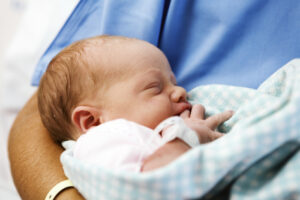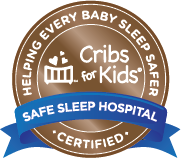We invite you to review this information, and we welcome the opportunity to answer any questions you have. We want you to have an excellent birthing experience and a wonderful stay in the Women’s Center at Jackson County Memorial Hospital.
TEAMBIRTH

JCMH is partnering with Ariadne Labs, a joint center for health systems innovation at Brigham and Women’s Hospital and Harvard T.H. Chan School of Public Health, to offer a TeamBirth approach for women during delivery. This innovation is a Delivery Decisions Initiative (DDI), a social impact program focused on transforming childbirth care.
TeamBirth is a communication and teamwork process that closes the gaps in communication during childbirth. The process improves shared decision making and puts the patient at the center of their care. Members of Ariadne Labs and OPQIC (Oklahoma Perinatal Quality Improvement Collaborative) came to JCMH to celebrate the launch of the new process. Tricia Short, Ariadne Labs, said, “This approach elevates a structure of communication to give all patients a sense of equity. We want to honor each patient and allow them the birth experience they desire.”
Barbara O’Brien, OPQIC, says, “Communication is a root cause for many errors in healthcare. This process improves the patient experience, helps the patient to trust the health care team, and gives autonomy to the patient. It is patient-centered care, which sounds simple, but isn’t a simple approach. TeamBirth elevates the patient’s voice and puts them at the center of the team, so all can understand what is happening and help in decision making. Instead of doing things to the patient, we do things with the patient.”
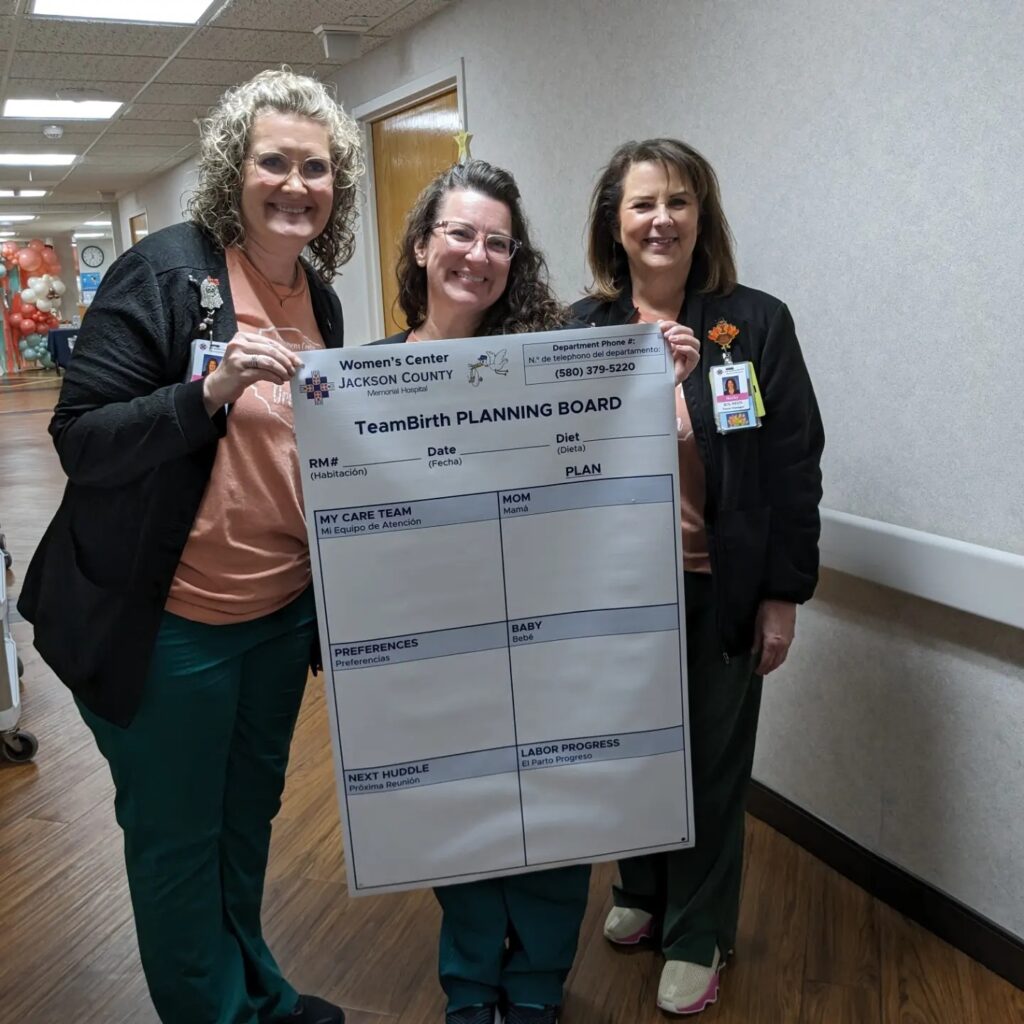
Becky Braddock, Women’s Center Nurse Manager, Stacey Ford and Natalie Dabelstein, Women’s Center Assistant Nurse Managers, Dr. Julia Rivera, OB/GYN, and Pediatricians Dr. Lindsey King and Dr. Liladhar Kashyap were just a few on hand for the program launch.
Dr. Rivera spoke, “When I came to JCMH to practice here, my friend Dr. Hyde and I wanted to make a difference in Altus. We have constantly changed and improved obstetric care here. We, fellow physicians, hospital administration, and of course Women’s Center nurses, have been able to do good things. With all of their support, we are continuing to improve with this new approach.”
O’Brien says many Oklahoma hospitals are now using this approach. “We are changing the culture of childbirth in Oklahoma.. This is a good program and will make a difference.”
NATIONAL SAFE SLEEP HOSPITAL
Jackson County Memorial Hospital is excited to announce that it has been officially recognized as a Cribs for Kids® National Bronze Certified Safe Sleep Hospital. The Cribs for Kids® National Safe Sleep Hospital Certification program awards recognition to hospitals that demonstrate a commitment to reducing infant, sleep-related deaths by promoting and educating on best safe sleep practices. JCMH is proud to hold this new title!
JCMH recently received Bronze Certification for meeting Cribs for Kids guidelines. As a result, we are able to provide new mothers with one free Halo Sleep Sack, education and handouts depicting a safe sleep environment. Congratulations to the Women’s Center staff and their dedication to providing the best care and training for new mothers and their babies!
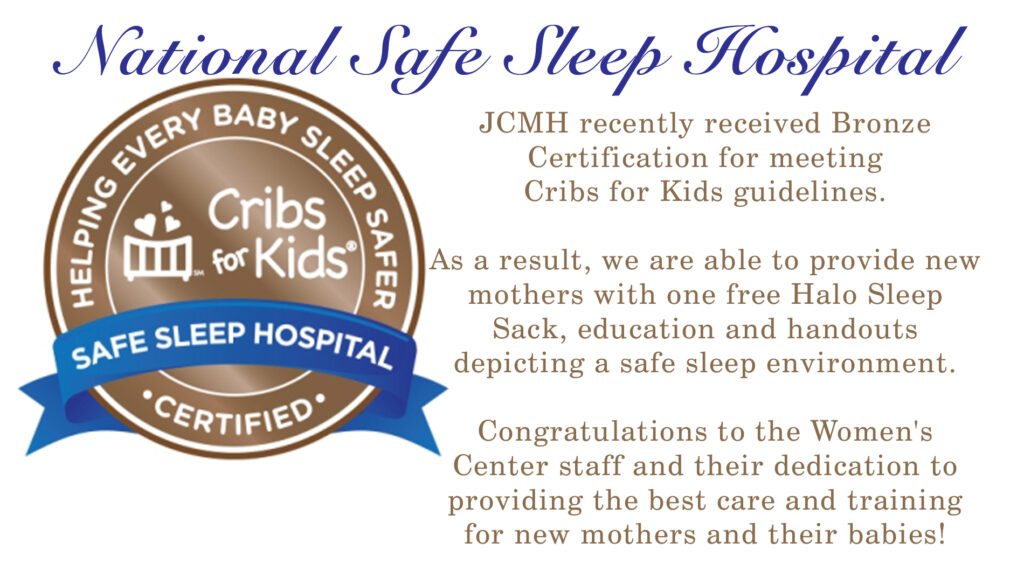
Best Practices for Safe Sleep
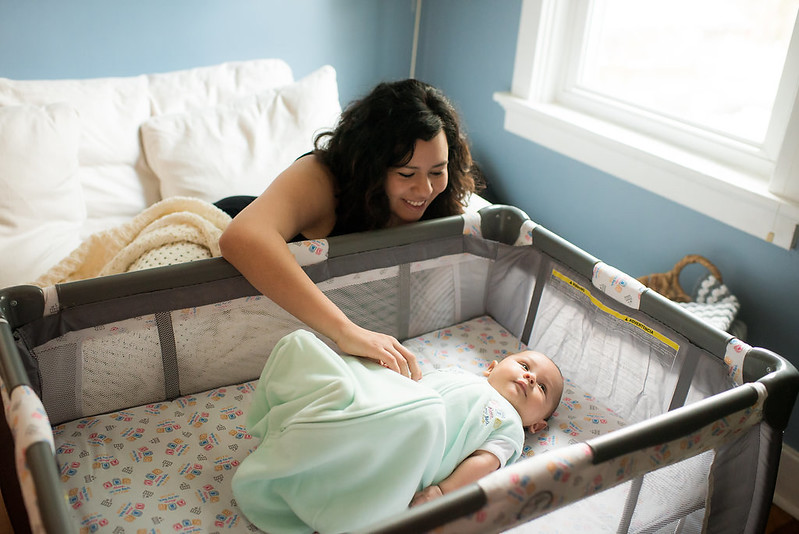
Here are tips to help create a safer sleep environment:
- Follow the ABCs of Safe Sleep:
- Alone – baby sleeps alone, without other objects, caregivers, or siblings
- Back – baby sleeps on his/her back
- Crib – baby sleeps on his/her own sleeping space, such as a crib or a bassinet
- Until their first birthday, place your baby on their back to sleep for naps and at night.
- Place your baby to sleep on a firm sleep surface covered by a fitted sheet.
- Room-sharing is recommended – keep baby’s sleep area in the same room where you sleep for at least the first six months, but do not let your baby sleep with you or anyone else in bed (co-bedding).
- If your baby falls asleep in a car seat, stroller or other carrier, move them to a firm sleep surface such as a crib, bassinet or portable crib for sleep.
- Never place your baby to sleep on a couch, sofa, or armchair.
- Keep soft objects such as pillows and blankets, toys and bumpers out of your baby’s sleep area.
- If you give your baby a pacifier, use one that is not attached to a string for naps and at night to decrease risk of choking or strangling.
- Breastfeed your baby (studies show babies who breastfeed have a lower risk for SUID (Sudden Unexplained Infant Death)).
Click the QR Codes for more training resources for parents and family members. These resources are free to you so you can learn more about Safe Sleep practices.
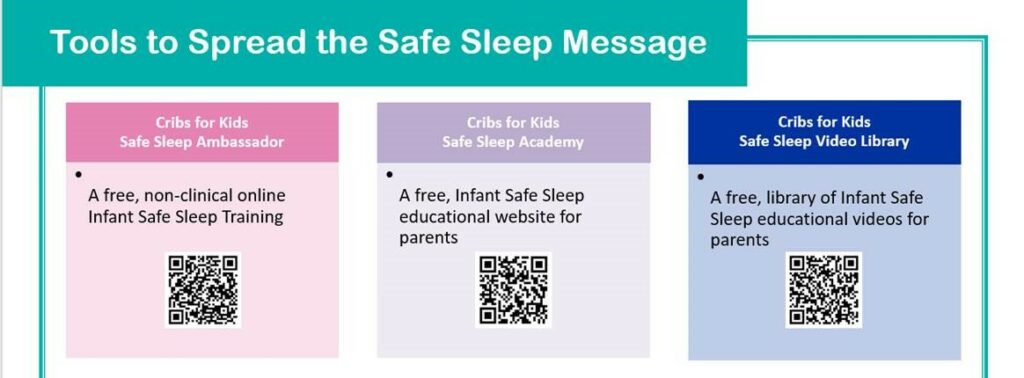
All American Academy of Pediatrics Recommendations:
- Back to sleep for every sleep.
- Use a firm, flat, non-inclined sleep surface to reduce the risk of suffocation or wedging/entrapment.
- Feeding of human milk is recommended because it is associated with a reduced risk of SIDS.
- Promote any human milk feeding of at least 2 months, and exclusively for at least 6 months-1 year or beyond if mutually desired by both infant and parent.
- It is recommended that infants sleep in the parents’ room, close to the parents’ bed, but on a separate surface designed for infants, ideally for at least the first 6 mo.
- Keep soft objects, such as pillows, pillow-like toys, quilts, comforters, mattress toppers, fur-like materials, and loose bedding, such as blankets and nonfitted sheets, away from the infant’s sleep area to reduce the risk of SIDS, suffocation, entrapment/wedging, and strangulation.
- Avoid weighted blankets
- Avoid ANY additional objects in the crib.
- Offering a pacifier at naptime and bedtime is recommended to reduce the risk of SIDS.
- Once breastfeeding is established
- Avoid smoke and nicotine exposure during pregnancy and after birth.
- Avoid alcohol, marijuana, opioids, and illicit drug use during pregnancy and after birth.
- Avoid overheating and head covering in infants.
- Discontinue infant hat use once the infant is thermodynamically stable, typically achieved after the first hours of life.
- It is recommended that pregnant people obtain regular prenatal care.
- It is recommended that infants be immunized in accordance with guidelines from the AAP and CDC.
- Do not use home cardiorespiratory monitors as a strategy to reduce the risk of SIDS.
- Supervised, awake tummy time is recommended to facilitate development and to minimize the risk of positional plagiocephaly. Parents are encouraged to place the infant in tummy time while awake and supervised for short periods of time beginning soon after hospital discharge, increasing incrementally to at least 15 to 30 min total daily by age 7 wk.
- Avoid the use of commercial devices that are inconsistent with safe sleep recommendations.
- There is no evidence to recommend swaddling as a strategy to reduce the risk of SIDS.
- Proper swaddling technique should allow the hips to be flexed and abducted to reduce the risk of exacerbating developmental dysplasia of the hip.
- Discontinue swaddling once the infant shows signs of rolling.
Questions
We want to answer any questions you might have about your upcoming birthing experience and stay at JCMH. JCMH endorses the Speak Up initiative: if something isn’t working correctly in your room, we ask that you please notify any staff member. We want the opportunity to remedy whatever problem you may be having as soon as possible.
Childbirthing Classes
TEAMBIRTH MAKES THE DREAMBIRTH! We are excited to launch our new IN-PERSON prenatal classes at JCMH!
The winter cohort is designed for families delivering between February and April. Registration for the winter cohort closes on 1/9/2024
Contact Women’s Center at 580-379-5222 or AshlieBreault@jcmh.com with questions
Register here: https://tinyurl.com/dreambirthwinter
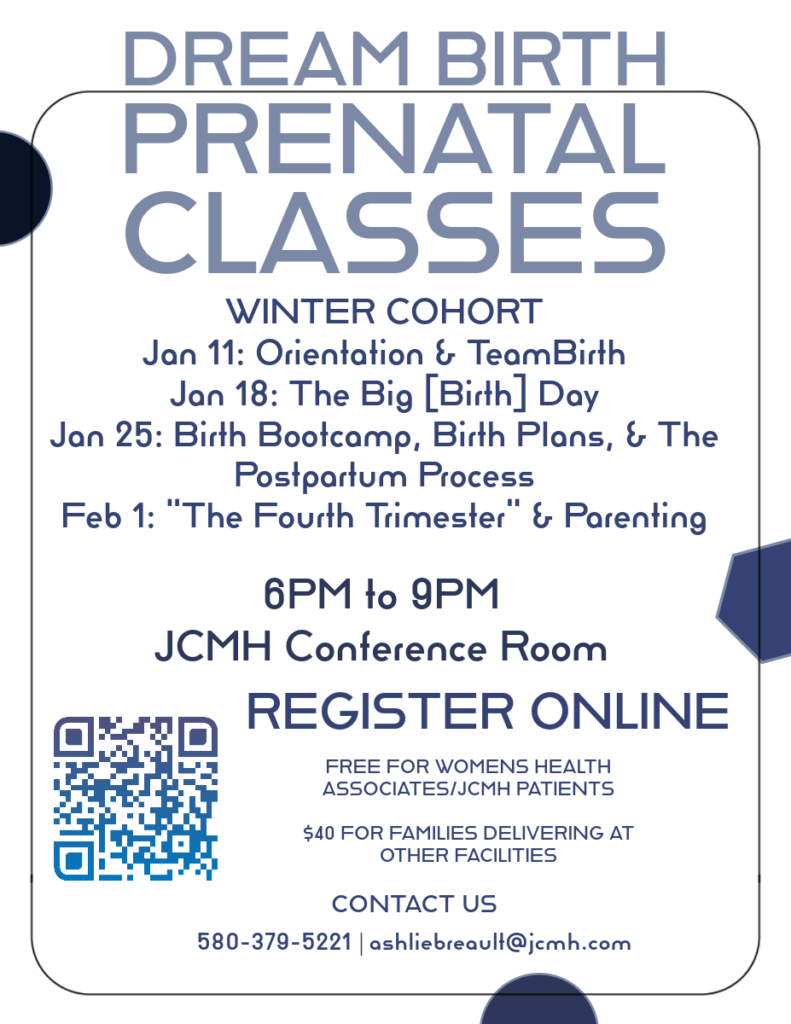
If you are unable to attend in-person childbirthing classes, we are offering an excellent resource, www.ExpectingPlus.com – and use enrollment code JCMHALTUS-EXP See the flyer for details – and there is also a Spanish option on the same page –
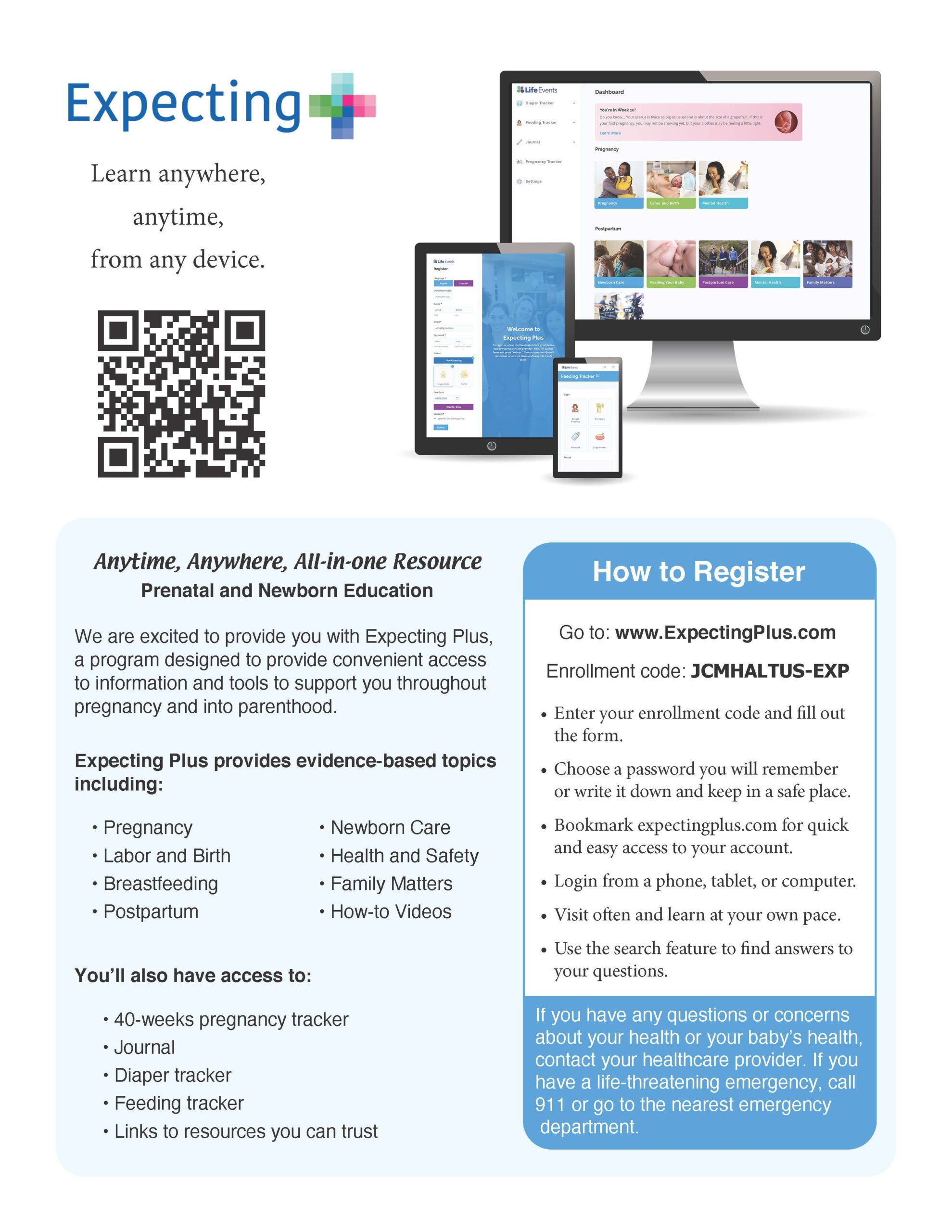
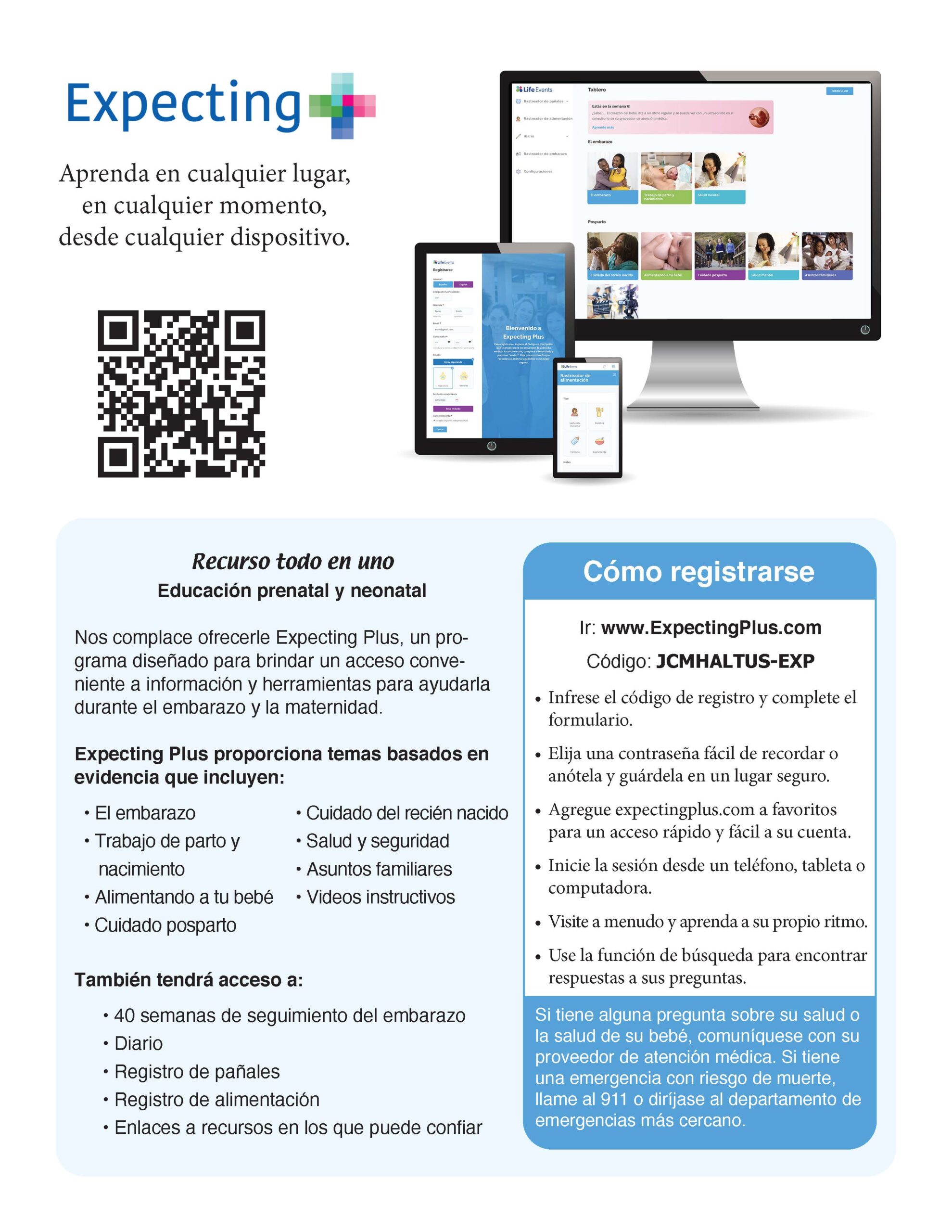
Visitors
We understand the importance of having support persons with you during the birthing experience. In order to better serve you, we ask that you choose support persons ahead of time to accompany you during labor. We ask that any other friends and family members wait in the Women’s Center waiting room. This will allow us to focus on you and your baby, giving you the personal and skilled care that you deserve. Hospital visiting hours are 9 a.m. to 9 p.m. Quiet Time is observed daily between 1 and 3 p.m. to allow Mom and baby uninterrupted time to rest and bond.
Meals
Inpatient Room Service is offered from 7 am – 6:30 pm by calling x5165 from your room or from outside the hospital (580) 379-5175. One free guest tray per meal is also provided for your convenience.
Rooming In
We know that the first few days you will spend with your newborn are extremely important. Once the baby is delivered, self-care is promoted. Rooming in is also promoted because it allows you to get to know your newborn. Comfortable LDRP (Labor, Delivery, Recovery and Postpartum) rooms provide wonderful accommodations for you during your delivery and for your visiting friends and family members.
Babygrams from Radiology
A Babygram is an ultrasound of your unborn baby done between 20 and 30 weeks of gestation. This can let you know the sex of the baby as well as give you images to take home and a video of the new addition to your family.
Schedule Your Own Babygram
You may schedule an appointment at (580) 379-5100. The charge is $120.75 due at the time of the exam. This will include the exam, images and a keepsake videotape.
Questions
We want to answer any questions you might have about your upcoming birthing experience and stay at JCMH. JCMH endorses the Speak Up initiative: if something isn’t working correctly in your room, we ask that you please notify any staff member. We want the opportunity to remedy whatever problem you may be having as soon as possible. Please feel free to call the Nurse Manager of Women’s Center at (580) 379-5220.
When You Go Home
At JCMH, we understand the importance of customer service. One way that we measure our patient satisfaction is by sending each inpatient a survey asking about their recent stay. Each returned survey is carefully reviewed. When you leave our facility, we want you to be more than pleased with your stay at JCMH. Our goal is to exceed your expectations by providing you with very good care.
Teaching Materials
Click on the titles below for more information about that topic.


